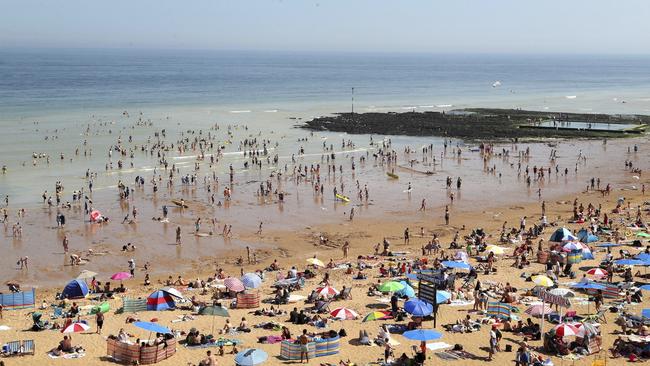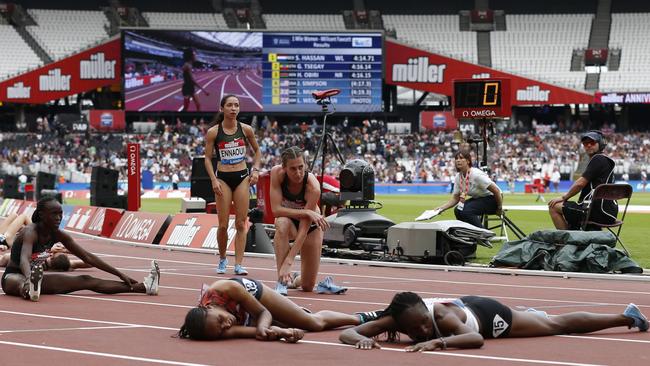Why British people can’t handle heat — and we can
ENGLAND is struggling through a heatwave that’s hit 32C — but before we scoff, there’s a reason so many people in the UK can’t cope with it. And the heatwave has huge implications for the world.
ON Sunday, a month after the British heatwave was declared, athletes collapsed on the finish line during the anniversary games at the Queen Elizabeth stadium in London.
It was a sign that even the fittest bodies can fail when forced to endure unusual or extreme temperatures.
While the top temperatures are not high by Australian standards, climate change and human health expert Dr Liz Hanna says “it’s all relative”.
President of the Climate and Health Alliance, Dr Hanna says humans become “acclimatised”, or accustomed to their environment.
“People who are not at all used to warm weather, particularly when it’s getting a little humid as well, can overheat very quickly,” she says.
Like Australia, Britain has come to expect an increase in hospital admissions during heatwaves, particularly among the elderly and very young.

The Met Office (like the Bureau of Meteorology) and Public Health England issue “Heat-health watch” warnings when temperatures are deemed likely to exceed certain thresholds.
These temperatures are thought to have a “significant effect on health if reached on at least two consecutive days and the intervening night”.
They vary according to the location. For London, the daily maximum threshold is 32C and 18C overnight. For North East England, it’s 28C and 15C respectively.
It might seem pleasant in comparison to our summer heatwaves, but as Dr Hanna explains, several factors come into play.
European buildings are made to keep warmth in, so once you get a few days of heat, the “heat island effect” kicks in and it’s very difficult for houses to cool down.

And the people are not used to the heat. Their bodies are not used to sweating so much so they lose important salts and minerals. And they don’t know how to behave to take care of themselves, they stay out in the sun for too long and forget to drink plenty of water.
In August 2003, the UK heatwave lasted 10 days and caused 2000 deaths.
Dr Hanna said the heatwave extended across Europe, with total figure closer to 70,000 deaths.
It was during that heatwave that the UK recorded its record maximum temperature of 38.5C at Faversham in Kent.
So the temperatures have not reached that level, but this heatwave event is not over yet.
The current watch level is 2 for “Alert and Readiness”.
The Met Office says the 2018 summer is on track to be one of the top ten driest and one of the top five sunniest with close to record heat, no matter what happens next.
Scotland and Northern Ireland have recorded temperatures above 30C for the first time since the July 2013 heatwave.

And there have been other climate-related consequences, including wildfires and drought.
A wildfire on Saddleworth moor in northwest England, believed to have been started by arson, raged for three weeks. Fires are also raging across Europe.
Water storages are running low, with parts of the country facing water restrictions. A ban on hosepipes and sprinklers is being introduced in northwest England on August 5, prompting advice for people to water their gardens with bath water.
The country looks brown from above and farmers are suffering. Crop yields will be down and poor grass quality is likely to reduce both the quality of milk and the availability of animal feed.
At the Australian National University, Dr Hanna now works in a voluntary capacity as an honorary fellow since the Federal Government stopped funding her research.

She says the same thing happened to every university group doing climate change research around Australia, which “makes us all bitter and twisted”. Fortunately some state health departments picked up the slack, because this country has to prepare for shocking future scenarios.

“What happens if the whole system goes down? How do we protect the community? This is where we need to do a lot more work, in terms of how we are going to prepare ourselves for extreme heat, because we are going to hit 50 degree days and that is very risky.”

